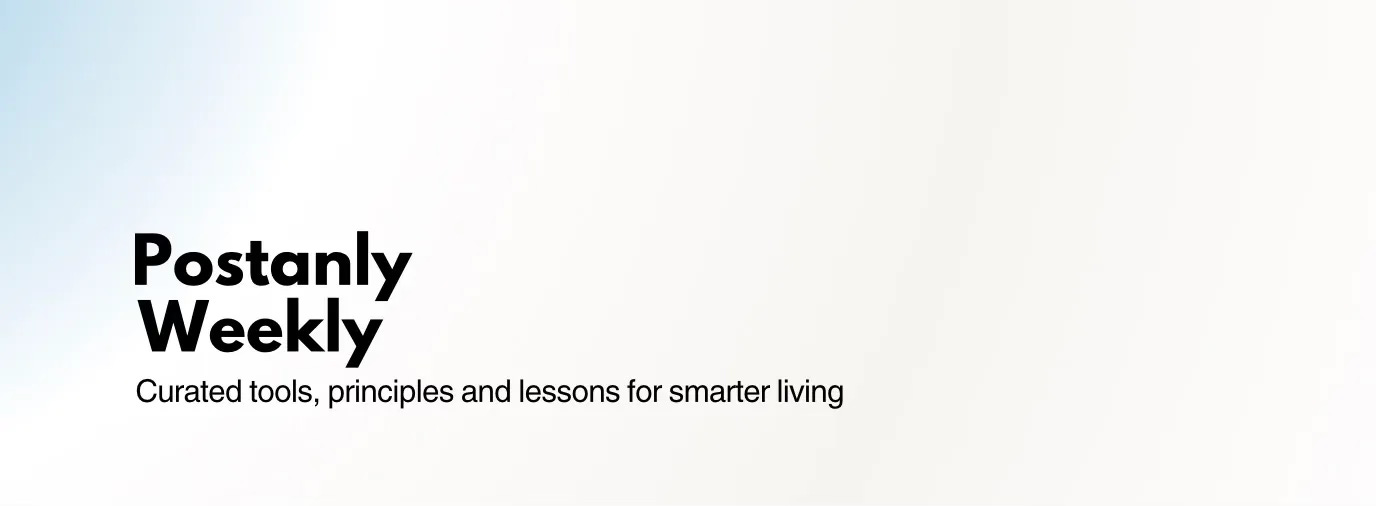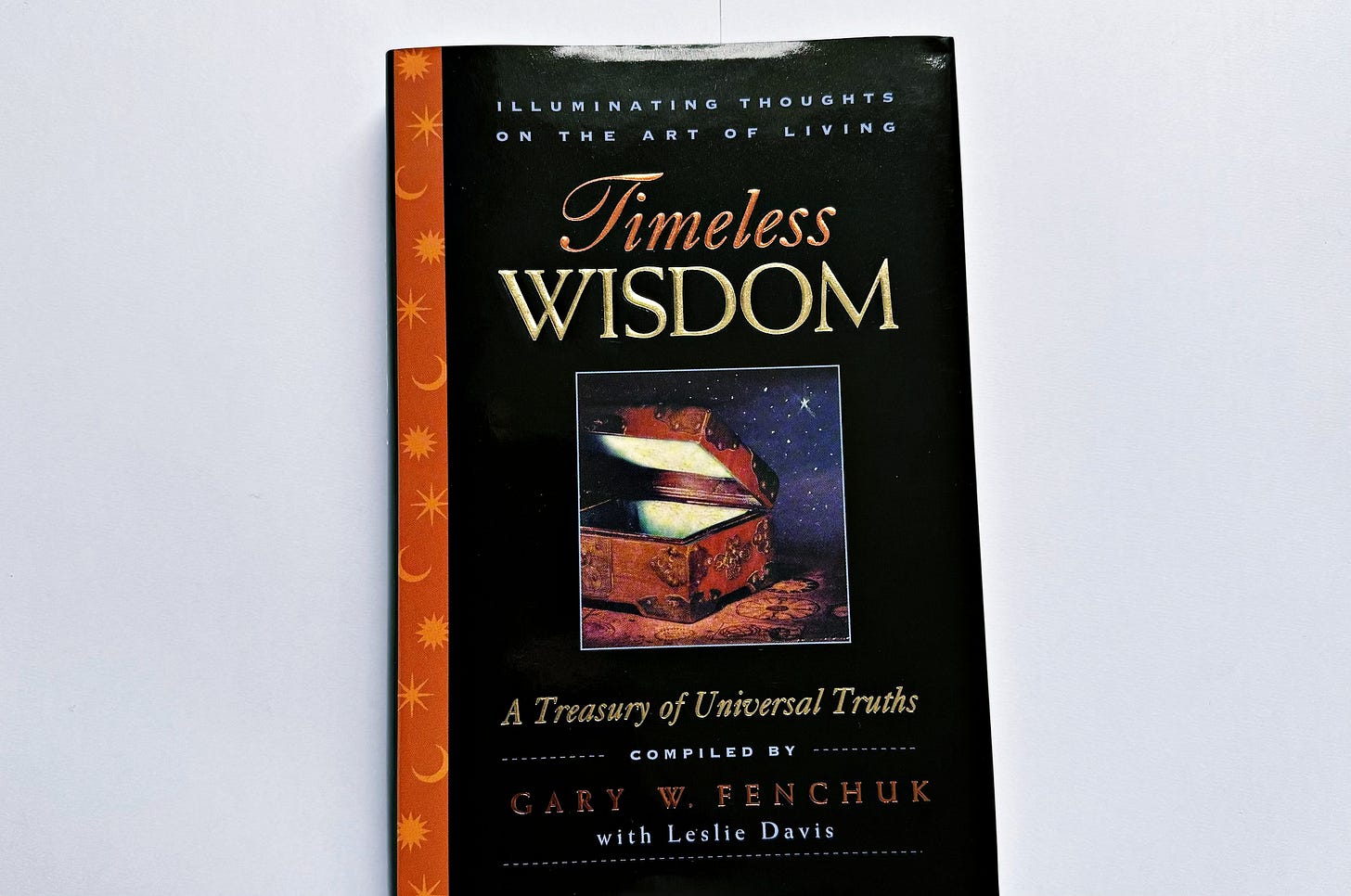40 habits for a massive return on life, 100 ways to live better and more
3 new ideas on better living
Hello everyone,
I’m Thomas. My goal is to help you master the best of what great thinkers, top performers, psychologists, philosophers and behavioural scientists have already figured out. All courses and books at Perennial Learner. Paid subscribers get more: an in invite to Thinking Toolbox (mental models for a great life) and Mental Wealth Toolbox (practical psychology, economics and philosophy concepts for smarter decisions every day). Plus best essays and tools for life.
In partnership with Morning Brew
Morning Brew — Get smarter in 5 minutes with Morning Brew. Get the most digestible daily email that makes reading business, finance and tech news enjoyable. Morning Brew condenses the day's most important stories into a short, quick, and entertaining read. It’s Informative, witty, and everything you need to start your day. Join the 4+ million people who start their day with Morning Brew.
Try Morning today (It’s Free).
Life-changing habits compound in our favour — they accelerate growth and help us become happy, healthy, and wealthy. “Doing one thing by yourself, for yourself, that creates joy is such an important habit,” says Jay Shetty. Many of these habits take a few minutes to practice, but they can have a massive return on your life.
If you are too busy for better habits, restructure your routine. You don’t need more time; you need to redefine your commitments. “It’s not that we have too little time to do all the things we need to do, it’s that we feel the need to do too many things in the time we have, says Gary Keller in his book The One Thing.
Some of these actions and behaviours can change the trajectory of your life in less than 66 days. They can soon become a productive way to spend your day.
For every demand on your time, pause or delay your response and think about the first and second-order consequences before saying yes.
Practice social media fast once a week and use that time to read a few chapters of your favourite book.
Write things down. Don’t try to remember everything. The brain is notorious for forgetting ideas.
Start your day with a plan — you will think less and move faster.
Plan intentional breaks in-between focus work — it will help you recover and recharge for the next task.
The world’s most successful people are always learning — be deliberate about how you feed your brain. Choose your knowledge sources carefully.
Begin your day with the end in mind — focus on a few high-priority tasks at a time.
Unplug yourself from work when it’s done — it improves mental clarity.
Schedule news time — don’t react to every news break or notification. It’s a productive way to take back time for what you care about.
Start your day with 5 minutes session — it improves flexibility and boosts your mood.
Drink at least a glass of water first thing in the morning to improve gut and brain health.
Listen to audiobooks and podcasts in your gap times: waiting for your coffee, commuting to work, or work breaks.
Make walking a daily or weekly habit — it’s the easiest and healthiest form of exercise to improve mental clarity and self-awareness.
Upgrade your mind every year. Embrace lifelong learning to accelerate personal growth. “Anyone who isn’t embarrassed of who they were last year probably isn’t learning enough.” — Alain de Botton
Track your habits that take away the biggest chunk of your time and do more of what’s working and less of what’s a time of time.
Recover from work stress by scheduling quality breaks or fun habits between focused work sessions.
Use some of the time you spend in front of a TV every evening to improve your reading habit. Read a few pages of your favourite book.
The first half of the day is an important time for high-value work. Don’t waste it on low-value tasks.
Smart learning also means unlearning old habits and patterns that didn’t serve us. Do more of what’s working every day.
Make your daily tasks outcome-driven. The bigger goal determines the tiny daily processes. “Begin with the end in mind.” — Stephen Covey.
Declutter your immediate workspace before you start focused work — distractions can ruin deep work.
Practice the one-tab rule — use a single browser tab when you are working. It minimizes web distractions so you can stay in a single task.
Limit the amount of time for every task. Set strict deadlines and don’t allow your tasks to expand the dedicated time.
Never stop learning. Never stop upgrading your mindset. Never stop expanding your perceptions. Become a student for life.
If your exercise routine is a chore, change it. Make it fun — that’s how you can make it sustainable.
Don’t fear the many attempts at success — to succeed more, you have to fail more. Replace “perfect” with “good enough” and keep moving.
Work on tasks that get you closer to your bigger goal. Master the habit of task elimination to reduce your time on unnecessary work.
Want to be a better thinker? Read deeper, wider, and slower. Choose your books carefully and make time for better learning.
Make daily walking is a must-have habit — your mental clarity depends on it. Plan to move often daily.
If you can’t resist notifications on your phone, disable them when you are working on your high-value tasks. Make your deep work sessions sacred.
Avoid stressful events, calls, activities, and people that take away your mental clarity first thing in the morning. Start your day right.
Finish your day on purpose by writing down the priorities for tomorrow.It’s a better way to start the day without wasting cognitive energy planning.
Start a weekly review — what worked well? Where did you get stuck? What can you improve? What should you stop doing? What caused you to stress?
Be intentional about how you read the news — filter your souces and stay with credible ones that focus on just the important information.
Don’t say yes when you really want to say no. Defend your time like your progress depends on it because it does.
Limit the number of decisions you make in the first half of the day. It’s a productive way to save energy for important work.
Invest in a hobby outside work that makes you happy, boosts your mental clarity, and leads to a fulfilling life.
Take your social relationships seriously. Spend quality time with your family and the people who make you come alive — your happiness depends on it.
Three things in life — your health, your mission, and the people you love.That’s it. — Naval Ravikant
Value rest as much as you value work. Your productivity depends on your downtime. Make time to reset.
Recommended Reads
Are you catastrophizing? Here’s how to stop assuming the worst. [Vox]— If you’re a person who spends even a minuscule amount of time consuming news of any kind, you may find yourself in a doom spiral: ongoing war, the upcoming presidential election, climate change, the withering of the media. It isn’t just news that can inspire despair.
100 Ways To Live Better [Putanumonit] — The good life is a frequent subject on Putanumonit. I aimed for this thread to be an inspiration to myself as well, writing down many things that I think I should do but haven’t gotten around to yet. I tried to steer a middle course between over-generalized Navalisms…
3 Ideas on Better Living
Derek Sivers on how to handle doubts
“If you’re in doubt about something that’s not in your life, try it. Things are so different in practice versus in theory. The only way to know is to experience it yourself. … Err on the side of yes. Try it. If it was a mistake, at least you’ll know first-hand, instead of always wondering.
If you’re in doubt about something that’s in your life already, get rid of it. Not just things, this goes for identities, habits, goals, relationships, technology, and anything else. Default to not having it, then see how you do without. … Err on the side of no. Get rid of it. Start with a clean slate. If it was a mistake, you’ll get it back with a renewed enthusiasm.”
Author of How to live: 27 conflicting answers and one weird conclusion
Poet and novelist May Sarton on talent
“A talent grows by being used, and withers if it is not used. Closing the gap between expectation and reality can be painful, but it has to be done sooner or later. The fact is that millions of young people would like to write, but what they dream of is the published book, often skipping over the months and years of very hard work necessary to achieve that end…”
Source: The House by the Sea
Professor of philosophy and cognitive science L.A. Paul on life choices
“As we live our lives, we find ourselves confronted with a brute fact about how little we can know about our futures—just when it is most important to us that we do know. For many big life choices, we only learn what we need to know after we’ve done it, and we change ourselves in the process of doing it. I’ll argue that, in the end, the best response to this situation is to choose based on whether we want to discover who we’ll become.”
Source: Transformative Experience
Tools I Use
Meco — Read all your awesome newsletters and Substacks on a single app. Meco is a distraction-free space for reading and discovering newsletters, separate from the inbox. Add your newsletters in seconds and liberate your inbox. Move your newsletters to a space built for reading and declutter your inbox in seconds. Enjoy newsletters in a space designed for reading. Check it out.
Morning Brew covers the latest news across business, finance, and tech in the most digestible way to save you time. The teams condenses the day's most important stories into a short, quick, and entertaining read. It’s read by over 4 million professionals. I read it every day. Try it and get a free ebook from me. Let me know when you successfully sign up.
I received a hard copy of the “Timeless Wisdom” from one of you earlier this week. It’s definitely “a treasure of universal truths.” Very useful. I appreciate the gift.
Thanks for reading!
Until next week,
Thomas



